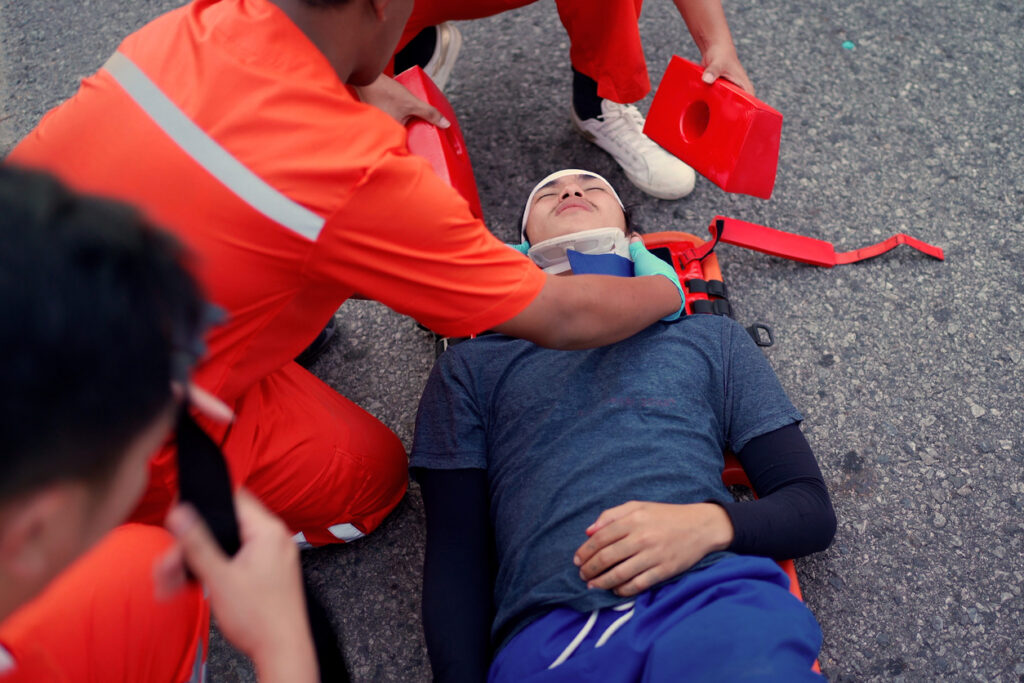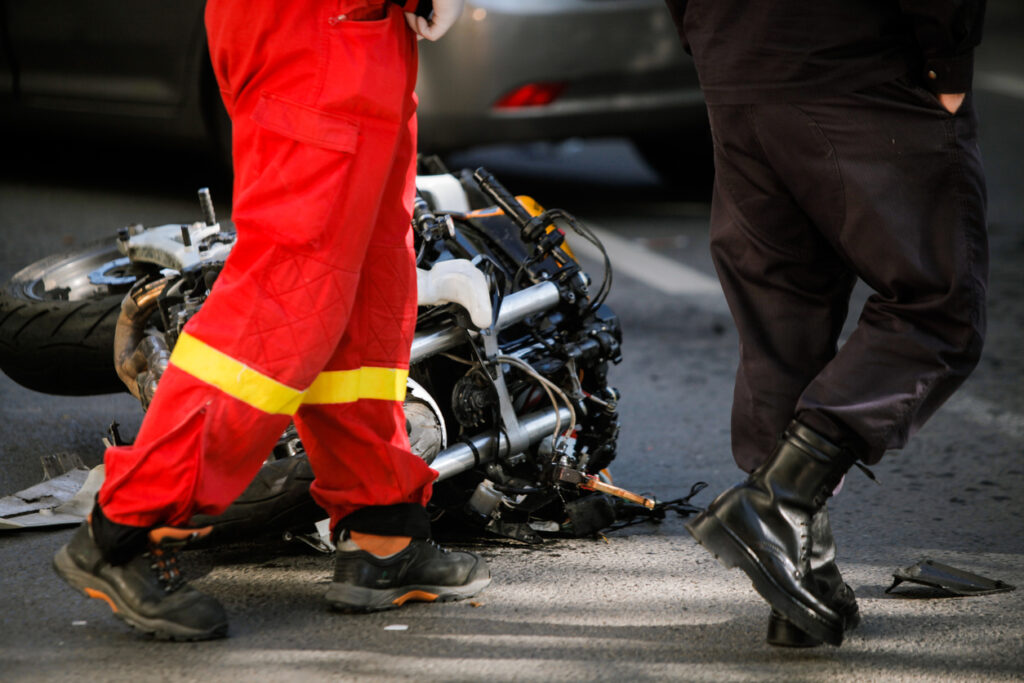The legal implications of filing a Colorado motorcycle accident claim with no helmet can be complex, especially in a state that does not mandate helmet use for adult riders. Understanding the nuances of liability, fault, injury documentation, and comparative negligence is critical when pursuing compensation after a motorcycle crash. While many believe not wearing a helmet forfeits your legal rights, Colorado law tells a different story—one that balances personal responsibility with the actions of other drivers.
The absence of a helmet might influence how insurance companies evaluate your claim, but it does not automatically eliminate your ability to recover damages. In many cases, the central legal question is not whether you wore protective gear, but whether another party’s negligence directly caused your injuries.
Helmet Laws in Colorado: What Riders Must Know
To begin with, Colorado law does not impose a universal helmet mandate. Riders and passengers under the age of 18 must wear a helmet that meets DOT standards, but for adults, helmet use is voluntary. This fact forms the foundation of any Colorado motorcycle accident claim with no helmet, especially when it comes to addressing liability and insurer tactics.
According to the Colorado Department of Transportation, while helmets are strongly encouraged, they are not legally required for adult riders. However, Colorado mandates that all motorcyclists wear eye protection, regardless of age. This distinction becomes crucial when insurers attempt to suggest fault or reduced liability due to helmet non-use.
Because Colorado statutes allow helmetless riding for adults, your choice not to wear a helmet generally cannot be used as evidence of negligence—unless your injuries are directly tied to the lack of protective headgear and the defense can show that a helmet would have significantly changed the outcome.
Understanding Comparative Negligence and Its Impact on Claims
Colorado follows a modified comparative negligence rule under C.R.S. § 13-21-111. This rule means a plaintiff can only recover damages if they are less than 50% at fault for the accident. The amount recovered is reduced by the percentage of fault assigned to the plaintiff.
For example, if you were found to be 20% at fault because you changed lanes abruptly or failed to signal, and the other driver was 80% at fault for speeding, your total compensation would be reduced by 20%. In the context of a Colorado motorcycle accident claim with no helmet, helmet non-use alone typically does not count toward fault unless your injuries are proven to have been significantly worsened by it.
Defense teams and insurers may attempt to argue that head trauma or brain injury would have been less severe had you worn a helmet. However, this argument must be supported by concrete medical or forensic evidence and does not automatically invalidate your claim.

Establishing Liability in a Motorcycle Crash Without a Helmet
Filing a successful Colorado motorcycle accident claim with no helmet still requires you to prove that another party was negligent and caused the crash. This involves gathering strong evidence such as:
- Official police reports that document the other driver’s traffic violation
- Photographs of the accident scene and vehicle damage
- Eyewitness statements corroborating your account of events
- Traffic surveillance or dashcam footage
- Medical records that link your injuries directly to the collision
Not wearing a helmet is only relevant when it is tied to the nature or extent of your injuries. For example, if you suffered a leg fracture or spinal injury, helmet use is irrelevant. Therefore, it’s critical to document not just the injuries, but the causal connection between the crash and the damage you sustained.
Medical Documentation and Legal Strategy
Medical records form the cornerstone of your Colorado motorcycle accident claim with no helmet. Seek immediate medical treatment after the crash and obtain a thorough evaluation. Your healthcare provider should clearly outline the diagnosis, recommended treatment plan, and likely prognosis.
You should also request documentation about whether a helmet would have changed the outcome of your injuries—especially if your injuries involve the head or brain. This can help prepare you to rebut common insurer arguments that aim to minimize liability or reduce settlement amounts.
If you sustained non-head injuries—such as broken ribs, internal bleeding, or crushed limbs—then helmet use becomes legally irrelevant. Even in head injury cases, the key factor is whether the crash was caused by someone else’s actions and whether a helmet would have realistically prevented the outcome.
How Helmet Myths Influence Claims and Settlements
Many riders assume that failing to wear a helmet automatically eliminates their right to compensation. This myth persists despite the fact that Colorado law does not require helmet use for adults. Insurance companies may exploit this misunderstanding to pressure riders into accepting lower settlements, especially if the claim involves head trauma.
In a legitimate Colorado motorcycle accident claim with no helmet, the presence or absence of headgear only becomes relevant under specific conditions. It does not impact whether a crash occurred, who caused it, or whether the other party breached their legal duty of care.
In court, defendants must prove that not wearing a helmet was a substantial factor in causing your injuries. This is a high bar and requires expert medical testimony. Therefore, the fear of automatic disqualification from compensation is unfounded.

Insurance Tactics and How to Respond
Insurance adjusters are trained to minimize payouts. In claims where the injured rider did not wear a helmet, they often use several common strategies:
- Arguing comparative fault by suggesting you failed to mitigate injury risk
- Offering lowball settlements under the assumption you’ll accept due to guilt
- Misstating Colorado helmet law to imply legal fault
If you’re filing a Colorado motorcycle accident claim with no helmet, prepare a strong response strategy. Cite the legal standard that adult helmet use is voluntary. Point out that negligence lies with the at-fault driver who caused the crash. Reinforce that injuries not related to head trauma are unaffected by helmet use.
You can also reference external legal guidance, such as Colorado motorcycle accident claim with no helmet, which clarifies that Colorado riders may still pursue claims even when not wearing a helmet, depending on the specific circumstances of the incident.
Timeline and Deadlines for Filing
Under Colorado law, most personal injury claims—including motorcycle accident claims—must be filed within two years of the date of the accident. If the accident involved a government vehicle, you may face a shorter notice period under the Colorado Governmental Immunity Act.
Missing this deadline can forfeit your right to recover damages, regardless of fault. Therefore, you must act promptly to initiate your Colorado motorcycle accident claim with no helmet. Retain all crash documentation, secure medical evaluations, and begin the claims process well before the deadline approaches.
Medical Evidence in a Colorado Motorcycle Accident Claim with No Helmet
When pursuing a Colorado motorcycle accident claim with no helmet, it is often necessary to counter arguments that your injuries were avoidable. Insurance adjusters may claim that helmet use could have minimized head trauma, attempting to reduce liability or compensation. However, such assertions must be backed by factual, case-specific evidence. To support your claim, you must demonstrate through medical records and expert analysis that the crash—not the absence of a helmet—was the proximate cause of injury. Medical professionals may be called upon to confirm that the injuries you suffered would have occurred regardless of helmet use, particularly in cases involving non-head-related trauma.
Establishing Causation and Countering Assumptions
Courts in Colorado rely on objective, documented findings when evaluating a Colorado motorcycle accident claim with no helmet. They do not assign fault based on speculation or generalized assumptions. A successful claim must establish that the other party’s negligence directly caused the accident and injuries sustained. Even in cases involving head injuries, the burden of proof remains on the insurer or defendant to show that helmet non-use significantly changed the injury outcome. A strong Colorado motorcycle accident claim with no helmet must stay focused on the core legal issue: proving the other driver’s actions—not your lack of headgear—led to the physical harm you suffered.

Severity of Injuries and Claim Valuation
In many cases, a Colorado motorcycle accident claim with no helmet involves more severe injuries than crashes where a helmet was worn. Traumatic brain injuries, concussions, fractured skulls, and severe facial trauma are more common. These injuries often result in longer recovery periods, greater medical expenses, and higher claims for pain and suffering.
Thus, while helmetless riders may face legal challenges, they may also require higher compensation to account for increased damages. Courts will evaluate the full extent of losses, including:
- Hospitalization and surgery
- Long-term rehabilitation or therapy
- Permanent disability
- Psychological trauma
- Lost wages and future earning capacity
If you suffer life-altering injuries, your claim must reflect the full spectrum of physical, emotional, and financial harm—not just the initial emergency care.
How to Handle Litigation in a Helmetless Claim
If settlement negotiations break down, filing a lawsuit may be necessary. During trial, your Colorado motorcycle accident claim with no helmet will undergo close scrutiny. You must be prepared to:
- Testify about your actions during the crash
- Explain why you were not wearing a helmet (legally optional)
- Present expert testimony on injury causation and comparative fault
- Demonstrate the at-fault party’s negligence in court
Litigation focuses on facts and law, not assumptions or cultural perceptions. Jurors will be instructed not to consider helmet use as automatic fault. Your attorney (if represented) or you (if self-representing) can also request specific jury instructions to eliminate bias based on helmet status.
Citing Legal Authority to Strengthen Claims
To bolster your argument, you may cite judicial precedents and statutes such as:
- Colorado Revised Statutes Title 42 § 4-1502 (helmet laws)
- C.R.S. § 13-21-111 (comparative fault)
- Case law affirming that adult helmet non-use is not per se negligence
You can also reference the Colorado Department of Transportation for up-to-date legal definitions and safety expectations.
These sources provide legitimacy to your claim and demonstrate that you are asserting your rights in accordance with Colorado law.

Helmet Non-Use Does Not Eliminate Your Legal Rights
Filing a Colorado motorcycle accident claim with no helmet is fully allowed under state law. While insurance adjusters may try to highlight your lack of helmet use as a defense, that alone does not invalidate your right to seek compensation. The strength of your Colorado motorcycle accident claim with no helmet depends on your ability to prove that another party’s negligence directly caused the accident and resulting injuries. Even in situations involving head trauma, liability cannot be shifted without specific, credible evidence showing that helmet non-use significantly altered the outcome.
Conclusion: You Still Deserve Fair Compensation
A well-documented Colorado motorcycle accident claim with no helmet can still lead to a justified financial recovery. Colorado courts demand evidence—not speculation—when evaluating how helmet use may have affected the injury. If you are pursuing a Colorado motorcycle accident claim with no helmet, focus on gathering strong documentation, medical opinions, and legal arguments that demonstrate the core cause of injury was the other party’s misconduct. With the right approach, your claim remains valid and compensable, even in the absence of helmet use.

Leave a Reply